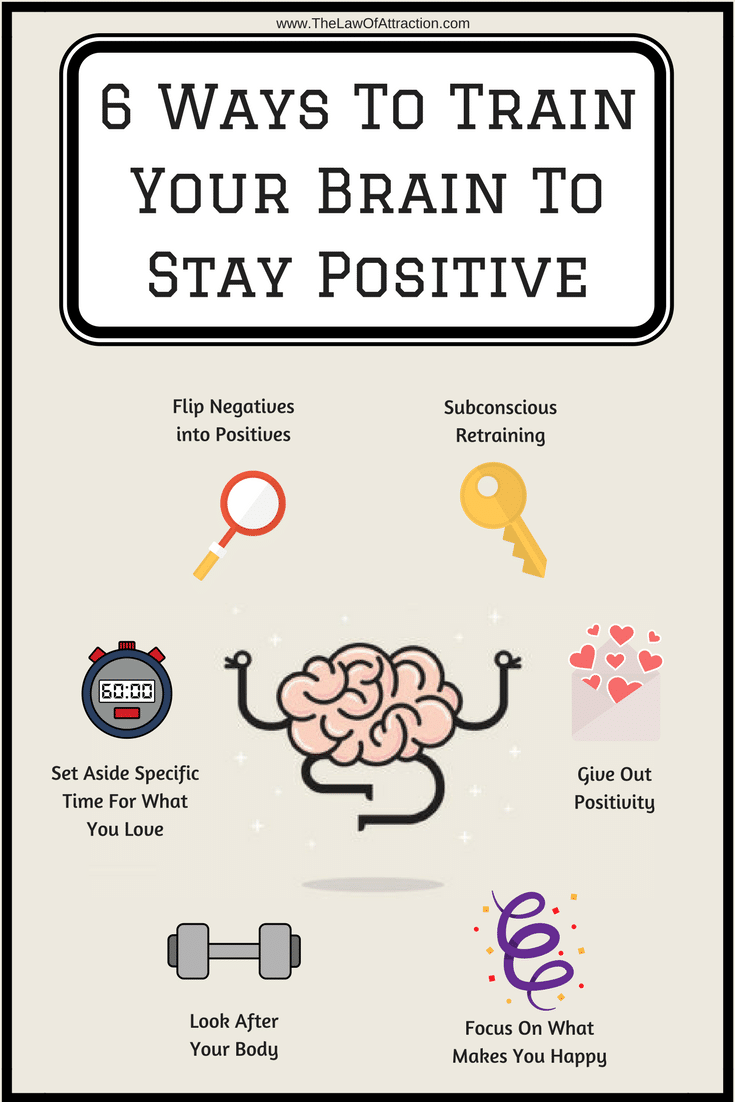

You’re undoubtedly familiar with the idea that it’s important to stay positive! Studies consistently show that having a more optimistic mindset improves both physical and mental health, and positivity boosts your internal vibration so you’re more capable of manifesting the thing you want.
But it’s not always so easy to stay positive when you encounter unexpected challenges or negative people. That’s why you need smart ways to train your brain to stay positive.
Try these 6 ideas to train your subconscious…
 1. Subconscious Retraining
1. Subconscious Retraining
Firstly, it’s worth learning more about the best modern techniques for uncovering and releasing the negativity you’re holding inside. Past experiences, especially those from childhood, can be held in the mind and body for decades, dragging you down and inhibiting your potential.
Exercises like tapping and neuro-linguistic programming can help you access these parts of yourself, and build a more supportive and affirming belief system (creating and reinforcing new synapses, especially in your prefrontal cortex).
Some people also find hypnotherapy or meditation plays a similar role.
You can experiment with multiple approaches, but the key message here is that creating and maintaining a truly positive perspective often starts with facing and letting go of long-term wounds.
There’s strong evidence that acts of kindness don’t just make others happy; they make you feel good as well. Even just taking a moment to do someone a small favor or help a stranger can put you in a better frame of mind, and break you out of a negative thinking loop.

If you get into a habit of doing something compassionate for another person every time you’re feeling down, anxious or hopeless, it’ll soon become automatic and your negative periods will last for increasingly shorter times.
One of the best ways to train your brain to stay positive is to deliberately and repeatedly turn your attention to things that inspire joy. It’s a good idea to dedicate a specific notebook to this pursuit, and use it to record 5 such things each morning.
Try to think of different categories as you do this. For example, interactions that make you happy, elements of the world around you that you find inspiring, and aspects of yourself that make you feel proud and confident. Whenever your thoughts are focused on joy, you’ll strengthen the associated neural pathways in your brain and will find more to be joyful about as a result.
 4. Look After Your Body
4. Look After Your BodyAll of our best research shows that what you eat and drink can have a huge influence on your emotional state, as can your approach to sleep and exercise. So, if you want to be a better positive thinker, take an honest critical look at how you treat your body and identify potential areas for improvement.
Diet is a big factor here. Are you getting all the right minerals, vitamins, and nutrients? Could you vary your food intake to support better health? There are established links between vitamin deficiencies and issues like depression and anxiety.
Meanwhile, not regularly getting 8 hours of sleep a night increases negative thinking and anger. As you treat the physical parts of you with more care, the mental and emotional parts of you will respond in kind.
With all of our work and social commitments, it’s easy to say we don’t have time for the things we love. However, without making the space in our lives for our biggest passions, we easily become despondent and negative.
Take an active role in maintaining boundaries that allow you to pursue these important passions. Perhaps try by setting aside an hour a day that won’t be interrupted by any other obligations. If you have to say no to other commitments to maintain this aspect of your life, then do it! You’ll be glad you did.
Finally, with a little effort, you can retrain your brain to automatically see the bright side of any situation, no matter how difficult. You’ll need to do this deliberately at first, consciously challenging yourself to see what’s good about a tough experience.
For example, when something doesn’t work out for you, it’s often because the Universe has something better in store. This may be something more fitting with your overall purpose. Try to find a specific thing you can learn, rather than viewing yourself as a failure.
In addition, try to turn setbacks into opportunities. If you don’t get called for a job interview or a second date, ask yourself what you can use the extra time to accomplish. In time, your brain will start doing this immediately, without being prompted. Your positive neural wiring will attract more and more positivity into your life.
